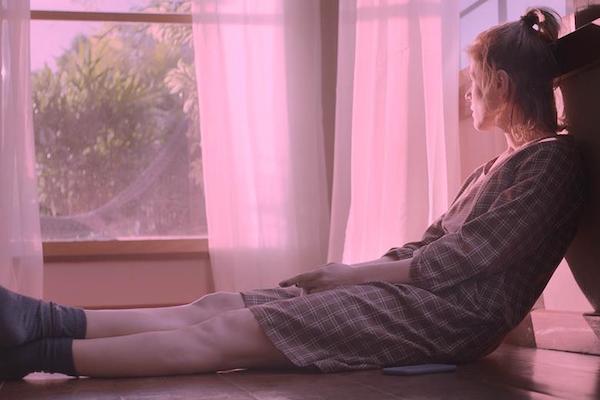Film Review: “The Pink Cloud” — Love During Lockdown
By Nicole Veneto
The Pink Cloud is a fascinating watch by sheer virtue of its accidental prescience.
The Pink Cloud, written and directed by Iuli Gerbase. Coming to VOD on March 3.

Renata de Lélis in The Pink Cloud. Photo: Blue Fox Entertainment
How much of the Covid-19 pandemic are we willing to see reflected in the media we consume? Do we even want to see any reminders of our current reality on television or in movies? As a media theorist, I’m fascinated by how quickly “the new normal” has been incorporated into commercials and advertisements (typically of the schmaltzy “we’re all in this together” variety). In contrast, visual narrative media has largely resisted assimilating things like masks, social distancing, and vaccine politics into their depiction of contemporary times. Perhaps now, more than ever before, media consumption is dedicated to looking for an escape. Any suggestion that there’s a devastating virus wreaking havoc throughout the entire world seems antithetical to that purpose. Consequently, most new media that’s come out since the outbreak began tends to ignore the effects Covid has wrought on our daily lives. Let’s face it: who wants to tune into Euphoria every week and watch Rue Bennett have to pull her mask down to snort a line of fentanyl during a Zoom party? I certainly don’t.
But what happens when a movie made just before the pandemic unintentionally predicts our current reality with uncanny accuracy? The Pink Cloud, the debut feature film from Brazilian writer-director Iuli Gerbase, opens with the following disclaimer: “This film was written in 2017 and shot in 2019. Any resemblance to actual events is purely coincidental.” When The Pink Cloud premiered at Sundance last year, critics lauded Gerbase for inadvertently capturing life during lockdown with stunning prescience. Rather than a virus though, the inciting incident that drives everyone inside their homes for a never ending quarantine is the sudden appearance of the titular pink cloud, a toxic gas of unknown origin that kills anyone exposed to it in 10 seconds or less. Whatever initial meaning Gerbase intended her film to have has effectively been subsumed by the significance it acquired as a Covid parable. For a film that wasn’t meant to be prophetic, The Pink Cloud hews scarily close to the world we now find ourselves living in.
Following a one-night stand, website designer Giovana (Renata de Lélis) and chiropractor Yago (Eduardo Mendonça) are forced to shelter in place together when the pink cloud descends over their city. Believing the lockdown only temporary, the two try to adjust to their situation as forced roommates, hopeful that the cloud will “go away soon” so they can get back to their respective lives and families. Around the 15-minute mark, the Brazilian government installs delivery tubes for every quarantined household so drones can bring food and goods to people. There is no longer any need to go outside. “Are we a couple?” Yago asks Giovana over ramen noodles, the tube sealed to the kitchen window hovering in the space between them. “We don’t even have sex,” Giovana replies, shrugging. In the very next scene, Yago’s already celebrating his 32nd birthday. “I heard [the cloud] might go away during winter,” Giovana muses just before she and Yago share a passionate kiss, effectively rekindling a sexual relationship. 30 minutes in and an entire year has elapsed, during which time the first rift between Giovana and Yago arises over whether they want to raise a child in a world that’s confined to a two-floor apartment. Barely 40 minutes into the movie, Giovana gives birth to their son, Lilo.
The pace at which The Pink Cloud unfolds is yet another inadvertent reflection of how Covid has affected how we live and experience our lives. There’s a mundane sameness to Giovana and Yago’s locked-down lives that makes the passage of time in the movie feel all the more jarring. The entire film plays out over the course of about 10 years, following the accelerated trajectory of Giovana and Yago’s relationship from casual hookup to forced life partners. Most of the drama comes from how their respective reactions to the cloud’s lingering presence affects their relationship; while Giovana constantly yearns for a return to normalcy, Yago is more willing to accept the reality of their situation. At one point he asks her, “Why do you suffer for things you can’t change?” This divide culminates in Giovana completely immersing herself in a VR headset at the cost of her relationship with both Yago and their son Lilo. Ostensibly, The Pink Cloud was originally about the distance that manifests over time between two people, more of an interpersonal chamber drama than predictive sci-fi.
Although The Pink Cloud is rife with acquired meaning, the movie itself is actually kind of boring to watch. Scene after scene plays out where Yago and Giovana video chat with their friends and family, introducing minor plot threads that are left unresolved, such as Yago’s father’s accelerating Alzheimer’s and Giovana’s friend Sara (Kaya Rodrigues) falling into a suicidal depression from quarantining alone. Any external drama falls by the wayside in favor of focusing on the pink-tinted melodrama between Giovana and Yago, which even at its ugliest never explodes into theatrical screaming matches or dishware being thrown. The most damage done is to the VR headset Lilo breaks to get his mother’s attention. Perhaps the reason we haven’t seen an explosion of narratives about our lives under Covid is that it’s not very entertaining to watch other people FaceTime each other and talk about all the things they can no longer do. It’s difficult to fault Giovana for retreating into simulated reality considering how weary all of us have become after nearly two years of masks, social distancing, and variants.
Still, The Pink Cloud is a fascinating watch by sheer virtue of its accidental prescience. Iuli Gerbase didn’t set out to make a Covid curio, but rather a soft sci-fi melodrama about romantic coupling and the motions all human relationships go through. Loath as we are to see our own miserable reality onscreen, Gerbase’s debut reminds us that we need to accept Covid as a major fixture in our lives now. This is the new normal, whether we like it or not.
Nicole Veneto graduated from Brandeis University with an MA in Women’s, Gender, and Sexuality Studies, concentrating on feminist media studies. Her writing has been featured in MAI Feminism & Visual Culture, Film Matters Magazine, and Boston University’s Hoochie Reader. She’s the co-host of the new podcast Marvelous! Or, the Death of Cinema. You can follow her on Letterboxd and Twitter @kuntsuragi for weird and niche movie recommendations.
Tagged: COVID-19, Eduardo Mendonça, Iuli Gerbase, Nicole Veneto, Renata de Lélis

